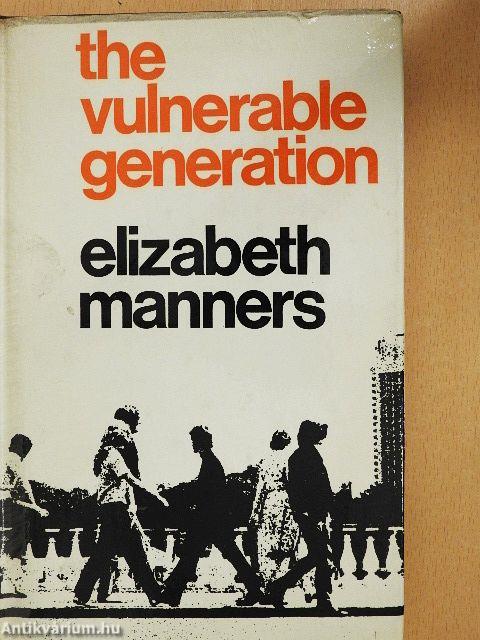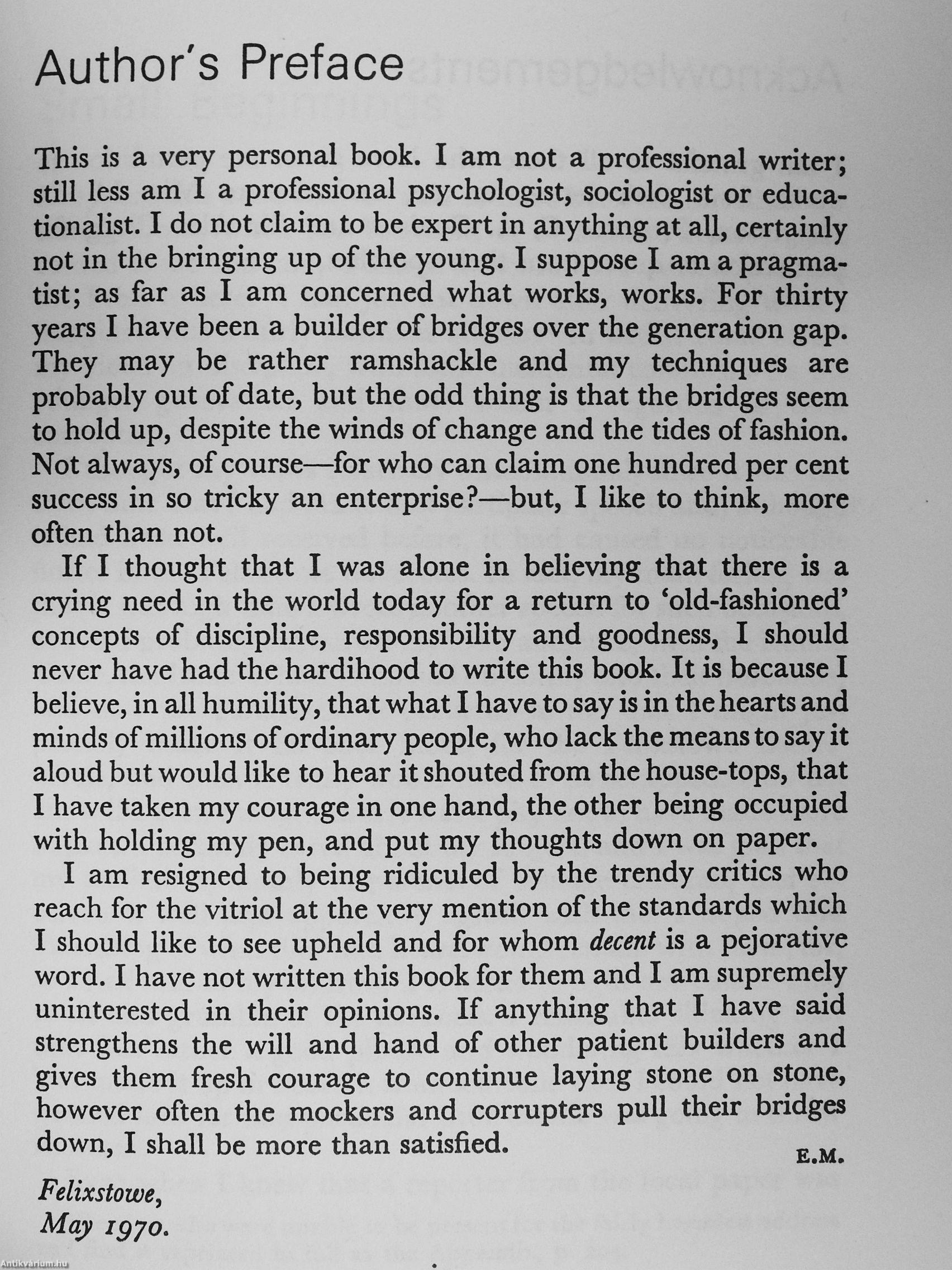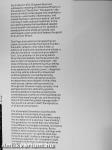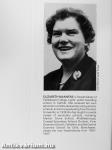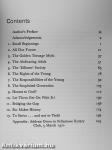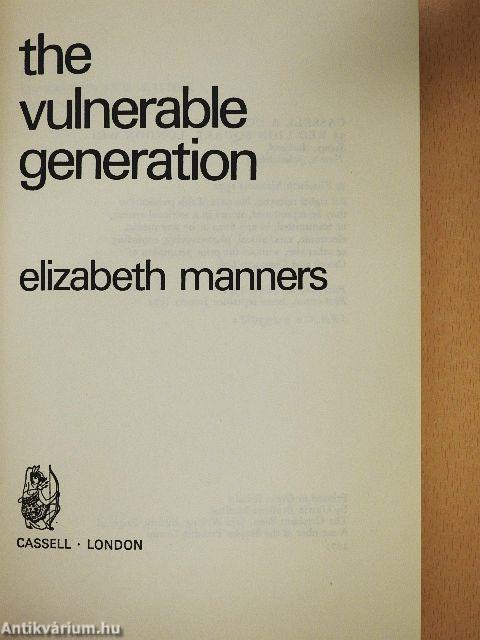1.104.812
kiadvánnyal nyújtjuk Magyarország legnagyobb antikvár könyv-kínálatát

VISSZA
A TETEJÉRE
JAVASLATOKÉszre-
vételek
The vulnerable generation
| Kiadó: | Cassell & Company Ltd. |
|---|---|
| Kiadás helye: | London |
| Kiadás éve: | |
| Kötés típusa: | Varrott keménykötés |
| Oldalszám: | 211 oldal |
| Sorozatcím: | |
| Kötetszám: | |
| Nyelv: | Angol |
| Méret: | 22 cm x 14 cm |
| ISBN: | 0-304-93688-X |
naponta értesítjük a beérkező friss
kiadványokról
naponta értesítjük a beérkező friss
kiadványokról
Előszó
TovábbFülszöveg
On 5 March 1970, Elizabeth Manners addressed a meeting of Felixstowe Rotary on the subject of 'Discipline'. The speech—the theme of which is developed and amplified in this book—was hardly inflammatory, and indeed had been used twice before; yet next morning it made national headlines. In the succeeding weeks the bewildered speaker found herself interviewed on TV, quoted in newspapers asfarafield as Canada, and submerged under sackfuls of letters of support from all over Britain.
The Press had seized on her speech as an attack on youth and the Permissive Society; the public rallied to itfor what it was: a defence of traditional standards and values, a plea for discipline 'rooted and grounded in love'. It is certainly not the young whom Miss Manners attacks, butthosewhom she sees as their corrupters and betrayers: the idols ofthe pop cult presenting drug-taking and promiscuity as the norm; masochistic dons agitating for student power; clergymen marching side by sidewith... Tovább
Fülszöveg
On 5 March 1970, Elizabeth Manners addressed a meeting of Felixstowe Rotary on the subject of 'Discipline'. The speech—the theme of which is developed and amplified in this book—was hardly inflammatory, and indeed had been used twice before; yet next morning it made national headlines. In the succeeding weeks the bewildered speaker found herself interviewed on TV, quoted in newspapers asfarafield as Canada, and submerged under sackfuls of letters of support from all over Britain.
The Press had seized on her speech as an attack on youth and the Permissive Society; the public rallied to itfor what it was: a defence of traditional standards and values, a plea for discipline 'rooted and grounded in love'. It is certainly not the young whom Miss Manners attacks, butthosewhom she sees as their corrupters and betrayers: the idols ofthe pop cult presenting drug-taking and promiscuity as the norm; masochistic dons agitating for student power; clergymen marching side by sidewith professional political agitators; journalists deriving vicarious thrills from urging the young to excesses they never dreamt of when they were young; admen selling everything through sex, however inappropriately. And perhaps most of all, abdicating parents standing aside and meekly accepting the contemptuous overthrow of the standards by which they were brought up, and thus doing their bit to foster the golden teenage myth— that youth is a virtue in itself, the repository of all power and wisdom.
The Vulnerable Generation is profoundly disturbing in its portrayal of a society increasingly brainwashed by the mass media into acceptance of a spurious 'new morality'; of a generation no worse than anyotherbut more affluent and widely informed, and hence easiergameforthe unscrupulous. Butto Britain's silent majority, trying—perhaps with waning conviction—to uphold whatthey know to be right, it offers a message of hope and encouragement: for 'it is betterto light one small candle than to sit and grumble at the dark'.
ELIZABETH MANNERS is Headmistress of Felixstowe College, a girls' public boarding school in Suffolk. She received her own education at State elementary and grammar schools, and since graduating from Durham University in 1 938 she has taught in a wide variety of secondary schools, including Marton Grove School, Middlesbrough. Consett Secondary School, Durham, Yarm Grammar School, Yorkshire, and the Central Grammar School for Girls, Manchester, where she was Headmistress from 1 959-1967. Vissza
Témakörök
- Szociológia > Társadalmi csoportok > Életkor szerint > Fiatalok
- Idegennyelv > Idegennyelvű könyvek > Angol > Pedagógia
- Idegennyelv > Idegennyelvű könyvek > Angol > Szociológia > Társadalmi csoportok > Életkor szerint > Fiatalok
- Pedagógia > Gyermek- és ifjúságvédelem
- Szociológia > Szociálpolitika > Egyéb
- Idegennyelv > Idegennyelvű könyvek > Angol > Szociológia > Szociálpolitika > Egyéb



